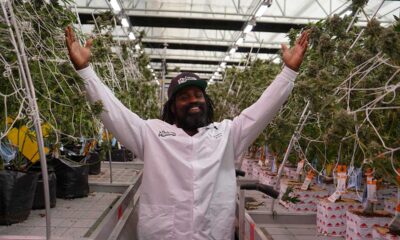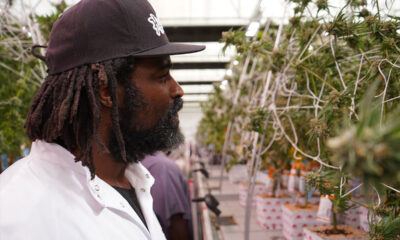Aficionados
Ricky Williams: His Journey from Pro Footballer to Pro Healer
Cannabis Aficionado spoke exclusively to Ricky Williams about his Real Wellness range, being a healer and his role as a cannabis advocate.
Published
4 years agoon
By
Melissa Reid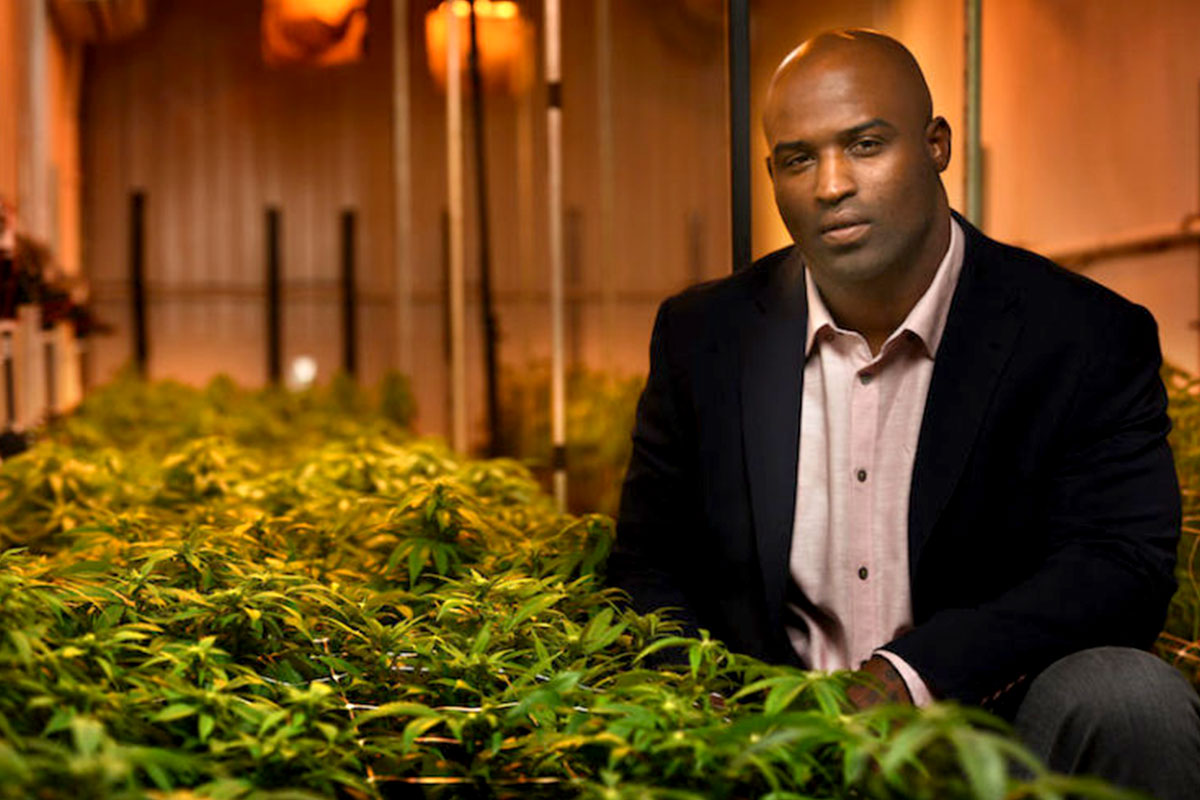
Since leaving the NFL, Ricky Williams has studied herbalism and alternative holistic therapies. Williams was suspended multiple times during his NFL career for his cannabis use but has spoken repeatedly about the benefits and effects of the plant.
Former running back Williams, who won a Heisman Trophy at Texas before spending more than a decade in the NFL with the Miami Dolphins and New Orleans Saints, has founded Real Wellness by Ricky Williams; a new line of cannabis-based products that also feature herbal extracts like lavender and turmeric.
We spoke to Williams about Real Wellness, his role as a cannabis advocate, and his new path as a healer.
Cannabis Aficionado: You’ve gone from being ostracized for your cannabis use, to being applauded for your advocacy. Now, you’ve redefined yourself again by helping shape the industry. How does it feel to be in the situation you are now compared to five years?
Ricky Williams: It’s definitely more stressful. I think to put your name and your passion behind something, especially something as controversial as cannabis, is risky. But it’s rewarding, you know? I feel like what I’m doing is meaningful and is changing people’s lives for the better. It’s a really good feeling. I find my purpose more in the healing work that I do.
My vision for cannabis is way beyond where I am right now. I’ve just realized that the steps I’m taking now feel like what’s required to get to where I’d like to get to in my advocacy. But it’s that tension between where we’re headed and where we are and I think that’s why we need people to advocate to help us move in that direction.
One of the most important things I’ve done in my advocacy is being honest about my experiences. As more people come out and be honest the stigma will naturally start to erode. The fact that people kept their cannabis consumption a secret, I know people that give me a hard time in the media that are consumers themselves.
I did a paper in school a couple of years ago about the effect of cannabis use on the relationship between parents and adolescents and it was mindblowing how many parents and kid relationships are torn apart because of the stigma [around cannabis].
The first time I spoke publically, I was shocked by how many people came up to me afterward and told me how touched they were not only by my words but my story, and how it gave them the courage to be honest about their journey and not be ashamed, and advocate for their rights to feel better.
It just shows you that anything is possible. If you believe in yourself and stick with it. Things are always changing.
Since leaving the NFL, you’ve become a certified holistic healer. Have you always been interested in alternative therapies?
I started by becoming a licensed massage therapist and other healing work I did while I was still playing football. I’ve just had more time and energy to devote to it now. It’s become pretty much the sole focus of what I’m doing — I’m still studying Chinese Medicine!
Playing football, being in a lot of pain and having injuries… I tried pretty much everything and certain things worked and I stuck with them, became curious and it took me down a path where I started to become a practitioner. Because I realized football is tough! So, you know for me, anything that can help me with this can have some use for a lot of other people as well.
What made you start your own line of cannabis products? Was it for healing and what you were doing with the herbs?
Yeah, that’s exactly what it was. I retired for the first time in 2004 and started traveling and that’s when I found Ayurveda. I went back to the states and I started studying Ayurveda in school. It was in California where medicinal marijuana was legal at a state level. And so I got my prescription recommendation and at the same time I was learning about Ayurvedic herbs and it just clicked. I started playing around in my kitchen putting together herbal formulas and combining cannabis. That was almost 15 years ago.
When I returned to play football in the NFL for another five or six years, instead of going to doctors when I got banged up I would go to my acupuncturist, I’d go to my herbal product store. You know, I’d just take care of myself. So, when I started thinking about doing something in a cannabis space, I looked around and realized people are talking about medicinal marijuana but you’d go to a dispensary and it’s just THC and CBD and there are no herbs in there. When they are combined, their synergistic effects they can be more powerful and more specific. I realized there’s a void in the market for truly medicinal herbal supplements with cannabis. So, let’s see if we can fill this void and that’s how we started.
Why do you there think there was a gap?
I think there was a big gap because of the stigma around cannabis, you know? Most people stay away from it because of the legal implications. With my background and the resources that I have access to, I was in a unique position to be able to start this conversation and start to bring products to the market that can serve as alternatives to the pharmaceuticals.
I started [playing football] early, in high school taking pain pills so I would be good to play sports. And by 18 years I had my first ulcer from taking too many pain pills. When I got into the NFL I had further difficulties taking pharmaceuticals. And so I started looking to find alternative ways to take care of myself that would serve me in the long run. And you know, in that same vein I found yoga, tai chi, and herbal medicine. I found a lot of different ways to take care of myself in ways that were kinder and gentler on my body.
You were able to turn your experience into a product that is able to help so many people.
And we’re working on it, you know. In my mind, I’ve really been benefitted by Chinese herbalism, you know? The Chinese have formulas for pretty much everything. And so in my mind, I have all these ideas of things I want to create. And on the other side of it, I’m working with my wife who handles the business side of it. That’s the other side of it and so, working together to find a way, especially with all the regulations in different states and finding other partners that match our philosophy and have the same commitment to quality and finding ways to get people interested in this.
There’s still a big stigma, you know? I mean people are more open now to CBD but my bigger mission is to point out to people that true healing doesn’t occur from taking a substance like a pharmaceutical. It comes from a changing consciousness a change in the way you see things and the way you handle your life. And one of the things about THC in altered states is that consciously, it has the ability to change our lives on a deeper level. And when you mix that with the herbs and the chemicals that work with our body, it becomes a powerful medicine that has lasting change and lasting healing.
That’s been my personal experience. The person I was before I retired from football for the first time and went on this healing journey was very different from who I am today. I look at all the change I’ve been through, the healing and growth and it’s really been quite remarkable.
I feel really good about my journey and I feel like I’m onto something and if I can find a way to share this message and get it out to the world, I can offer that same kind of healing and change and happiness for a larger group of people.
Being able to offer something that can offer relief to people that are suffering and using your power for good.
Yeah, like when I was a kid and I thought about wanting to be a football player it wasn’t so much about the fame for me it was about realizing that it would give me a platform. And as a kid, I didn’t know what I would use that platform for but I’ve always had a gentle heart. Always had a lot of compassion for people, and in my own life, I’ve suffered a lot. And learning about herbs, you know… simple things that tortured me as a kid. I realized there are simple remedies available that I just didn’t have access to. So, if I can stop people from suffering as much as… as I did. You can use that energy for more growth instead of having to recover or suffer.
If you remove the bad stuff you’re left with a focus for the good things.
Yeah, and even the good things are still challenging but at least the challenge puts your further on your path and you’re not just going back to feeling decent, you know? The first part of my life, I spent my energy just trying to feel ok. Since I’ve learned and grown, I use my energy to feel better. I feel like my cup is running over, and I feel like I have excess resources, excess time, excess energy to be able to share with other people.
I feel like I’ve been fortunate to have a lot of personal success at a young age and so I kinda checked that off my list and I truly only get happiness or benefit from sharing what I know and sharing what I’ve learned and also being touched by people who’ve been willing to share things about themselves and about their journey.
How have the Real Wellness products been received?
They’ve been received really well. We have a topical that people seem to really love. We think our most interesting product, we call it the Optimized Tonic and it’s an herbal formula I got from one of my herbalist teachers. My herbalist has a story with it and says the monks who practice martial arts, the Daoist monks, they studied herbs and acupuncture and so they started creating formulas for their training processes. So, Optimized Tonic is an herbal formula that is used to increase flexibility.
What I love about it is the Daoist and the Chinese didn’t separate the body from the mind. They realized herbs that improved flexibility in the body also improved the flexibility of the mind. So this formula is really great for anyone who feels stuck, whether it’s physically stuck like arthritis or stiff joints or whether they feel emotionally stuck, you know it’s the herbs really get the energy moving and the CBD helps the body hold on to and return to homeostasis. Its really powerful medicine and people are having really positive effects.
I think what’s been the most pleasantly surprising experience is what I see reflected in other people. The first time I took an herb to help myself, I’d broke my arm while playing football. they gave me morphine after surgery to repair my arm and it made me kind of sick. My neighbor told me about arnica. I took a little bit, not that much, and I literally was pain-free a few days after surgery. It dawned on me how powerful herbs can be. As CBD becomes more popular and people who have experiences with herbs are having the same realization, and people who have used our products are surprised how effective herbs can be in making them feel better.
Any plans to extend the product line?
It’s something we talk about on a daily basis. In the US right now, we have a big opioid epidemic so first on our priority list is creating pain capsules that will give people an alternative to opioids. Also, I was at an event in Toronto a couple of years ago and I met these women, sisters who were suffering from eczema. They had tried everything and I made a promise to them that we would come up with a topical that would help [with their eczema], so that’s something else on my list. another thing people are really struggling with is sleep, and the Chinese have some amazing formulas that will calm their mushin and calm their mind and help them get to sleep.
We’re also currently in talks with different manufacturing partners in different states to have our THC products available in other states.
You’ve probably sampled everything that cannabis has to offer. What’s your preferred method of consumption?
I’m old fashioned, I still like to inhale, I like to smoke. There’s something about the raw herb that feels very natural and deep.
When it comes to the NFL’s current stance on cannabis, do you see it changing anytime soon?
The NFL gets a hard time but they test players once a year in the offseason and players are free to do what they want as long as they pass that test, they’re pretty lax.
It would be nice if they were more advocating for player wellness but at least they don’t give players too hard of a time.
Have any current or past NFL players reached out to you for advice on cannabis or using your products?
I’ve had a player reach out and ask about his mother who was looking for an alternative to alcohol for relaxing and her anxiety, so we sent her a care package and she says it’s going well.
To access THC, although there are delivery services, most people have to visit a dispensary, which people can be uncomfortable with. So we’re trying to find creative ways to make the whole experience less intimidating.
As a health advocate, how would you convince the average person to accept and try your products and cannabis-based medicine?
I think about this a lot. I go straight for the mind-altering effects and I say we have a vape cartridge called Serenity. it’s 3:1 CBD/THD and infused with six other herbs that are known for working in partnership with the nervous system. I would say think about an issue in your life that’s been causing you issues. Take a puff of Serenity and sit there and allow yourself to start brainstorming about possible solutions. It’s cliche but its true; when you can relax and let go of preconceived issues you can find creative ways to look at things and deal with them.
So you want your products to give people hope?
Yeah, hope is extremely important and sometimes just a ray of hope is enough, it supports our perseverance.
Real Wellness from Ricky Williams is available in dispensaries across California. The CBD only products are available online.
Aficionados
Ophelia Chong: Why We Should All Grow Cannabis at Home
Published
3 years agoon
September 1, 2021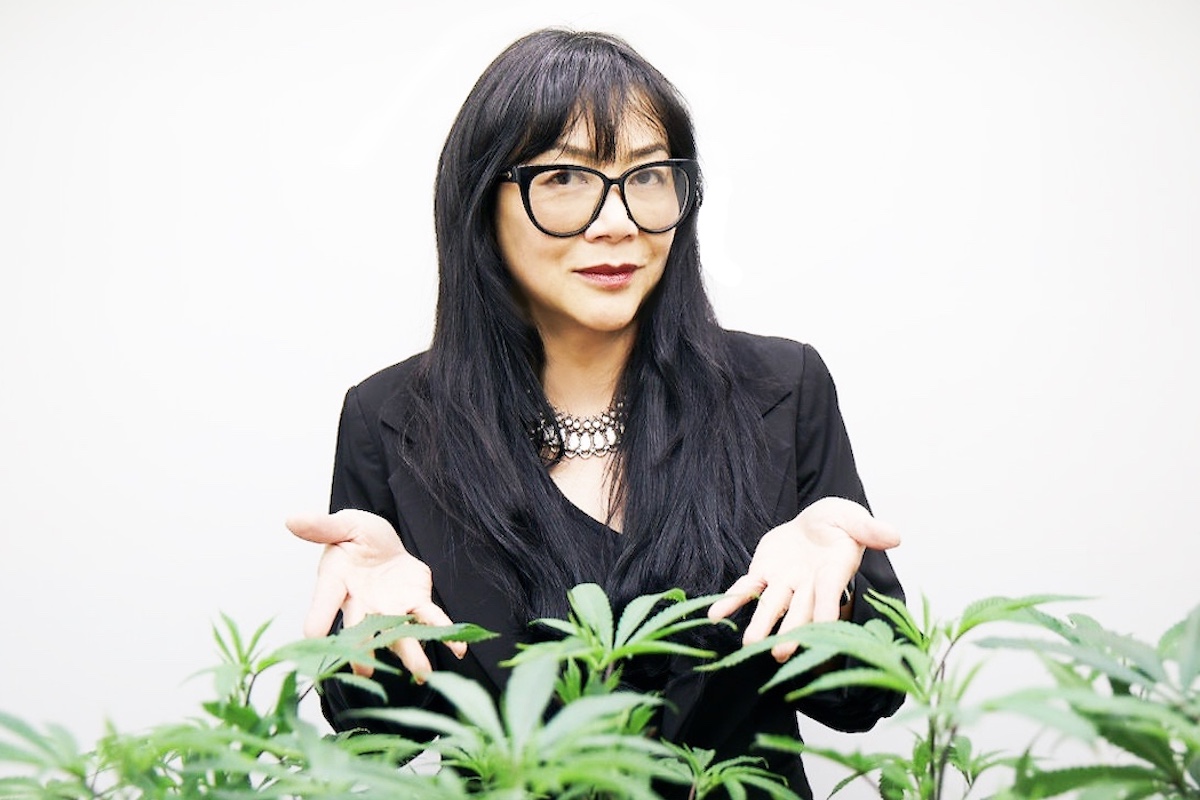
In the space of a few short years, Ophelia Chong has become an indomitable force in cannabis. The founder of Asian Americans for Cannabis Education came into the cannabis industry through family illness and quickly realized there was much work to be done around changing the stigma of cannabis and its users.
Chong posses a stunning amount of poise and grace adorn her razor-sharp eye and wit. These characteristics have led her through an illustrious career in design advertising and imagery for top-level clients.
She is one of those advocates pushing for all of us to grow cannabis at home — and she leads with her actions. So when you read her words, know that it is preceded with plenty of action.
Cannabis Aficionado: Tell us, who is Ophelia Chong?
Ophelia Chong: Let’s start with the physical. I was born in Toronto, Canada. I became an American citizen in 2000 which I’m very thankful for. Considering our political climate right now, I might not have been able to get in and it would be a harder road today to becoming a citizen. I came down here and graduated back in ‘89 from the Art Center College of Design.
I went into photography to support myself and was hired by David Carson at Ray Gun. I shot for them for about three years. I followed him after he left Ray Gun and worked for about a year for his clients. Because I was in that business of shooting bands and art I was hired by many other labels as well and eventually came up on the radar of some film companies.
One in specific was Strand Releasing, and they are a niche. It was right around the time of Sex, Lies and Videotape… Sundance just started bursting out. I was involved with that because the company I was at acquired a lot of films for Sundance, Toronto Film Festival, Berlin and New York, Outfest, that were in our niche. We were always on the fringe. Plus, a lot of LBGTQ.
What was the majority of the work you were doing at this time?
I was a creative director, so marketing films, designing and we were a very small company, so everyone did a lot — but we did a lot. We either released on DVD or video and also theatrical, probably about 50 films a year. Because of that, I joined Slamdance film festival, which runs congruent with Sundance, for 10 years as their creative director. Releasing and directing their film festivals and all that. Chris Nolan had his first film with us at Slamdance.
Then let’s fast-forward to Jennifer Aniston where I got snagged from a film company to design her website, which no longer exists. And I’m not going to say the URL because if you go there, it’s all porn. Someone snagged that all of her real quick. Then from there to publishing; I designed monographs for about 10 books over four years. So, a large monograph. Then I went to magazine design and a lot of illustration as well. Book covers, for Simon & Schuster and I am featured in about 10 books with my illustration work. A lot of work by hand and letterpress. I’ve had many gallery shows, my work is at Saatchi and Saatchi in letterpress. Everything I do, I love it, it just seems to get out there.
View this post on InstagramPopping seeds this weekend #growroom #DNAGenetics #PRHBTD 🙏🌱🌱🌱🌱🌱🌱🌟
A post shared by Ophelia Chong (@opheliaswims) on
What was the catalyst for your transition into cannabis?
I discovered cannabis in 2015 so I’m a very late comer. I’m not an OG. I’m not one of those people that are out there with Dennis Peron. I’m not going lay claim to that.
I got involved in it for personal reasons. My sister is very ill, she started to use cannabis to relieve some of her issues. She is still on it she is on CBD. And that’s why I came into weed, so we can fast forward to all of this.
So, you didn’t really have interactions with cannabis younger in your life as a designer and an artist?
No, because on March 18 I just celebrated 14 years being sober. That’s sobriety from alcohol. Because of that, in those 14 years, I had to abstain from everything. Because if you are in AA, you can’t say well I can do this, but I can’t do that.
In the last five years, I had to really make the decision to be in this industry. If I’m going to be consuming this, what do I do? So, I made a plan for myself; “OK, so you can start by trying an edible. Then you can only have it at night after your work.”
I have to set up these boundaries for myself. And I still adhere to it now. I only will have one joint at night after I finish working. Usually after eight or nine and if I need to, I’ll take an edible to go to sleep. Because I know my own habits and how I operate and if I don’t control it in that way, it can get out of hand.
What is it about edibles that you like?
It’s going back into working with how your brain works. An edible is not food, but it can be considered food because you’re chewing and tasting. So, I went that way at first. It took me about six months after I was in cannabis to actually smoke a joint. Because there was an inherent fear of falling off the wagon. That was my biggest issue because I had worked so hard to stay sober, so I really needed to work a way that I can smoke and still manage my obsessive compulsiveness. Because alcohol is that. It’s about drinking so much or telling yourself you’re not an alcoholic because you don’t drink on weekdays but you do get flipped on weekends. But that still an alcoholic, it’s the mindset that you use to justify something. I needed to work my way through all that.
So now I really do enjoy smoking and ingesting an edible or a tincture. But in public, if I am driving, I will not smoke because I know the effects of driving under the influence of alcohol. With cannabis, I know how it affects me, I get very tired, basically, it helps me sleep, so I know I can’t do that when I’m driving.
I don’t need to show someone I am in the business by smoking in front of them. They need to understand my reasons why I can’t. I do believe though if you are in this industry, you do need to smoke. I’m not going to hold it against you if you’re not smoking it right there in then. I’m not going to use it as a litmus test like that. Hopefully, people don’t use that on me when I say, “Hey, I would love to, but I just can’t right now.”
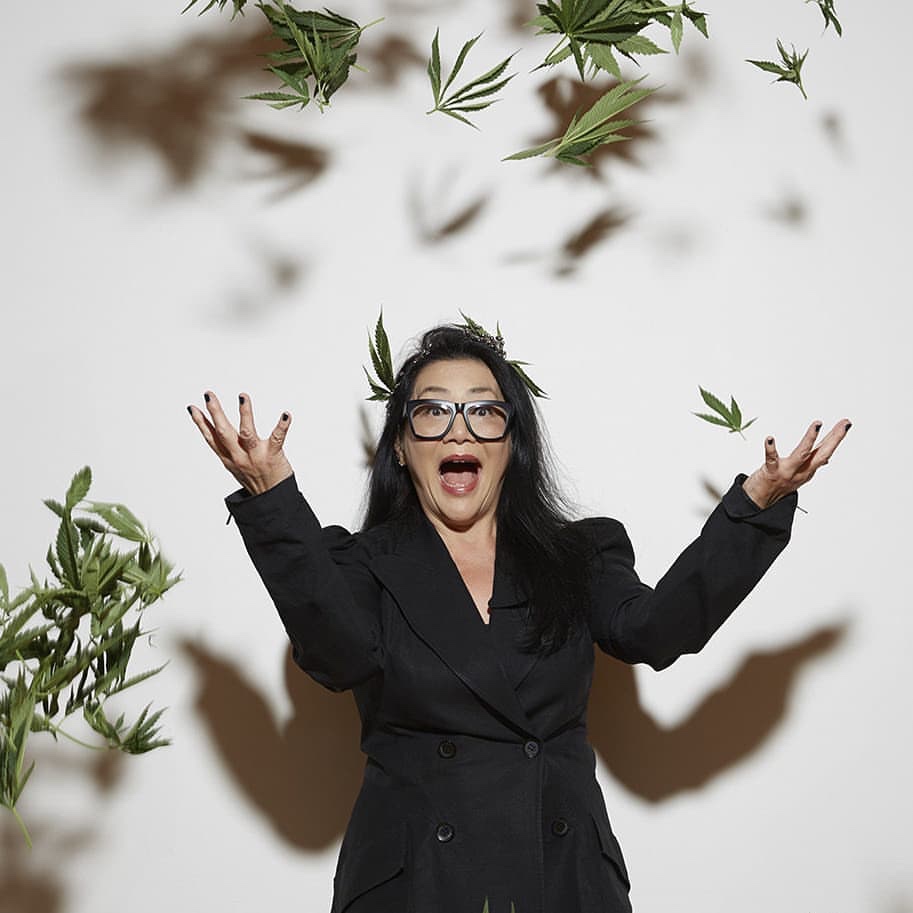
PHOTO | Josh Fogel
Could you speak a little bit more to what you’ve noticed about the ability to use cannabis and have it not affect your alcoholism? What is that discovery like?
Part of alcoholism is the need to disentangle yourself from reality. I use cannabis to fall asleep. I’m not using it to leave where I am right now to a different reality, right? I’m not doing it to get that high. I’m getting high so I can fall asleep. That is the difference.
With alcohol, I was using it to just get out of my own head because of the pressure I was under. I was at the end when I stopped drinking. I was with a company that was very high pressure and also the people I worked with were alcoholics and previous cocaine addicts. I was in this environment with people who had no filters and no boundaries. Being a people pleaser, I would drink along with them and at one point I just couldn’t do it anymore. I looked at my behaviors and I realized I just had to stop.
With cannabis, when I’m around people that are high it’s different because it is a different type of behavior. As you know a drunk is way different than someone who is stoned. What I’m getting at is for my use I see it differently. I see my use with cannabis as a way to relax and fall asleep not to black out and leave reality. When I’m high, I am still in reality, I am still experiencing everything as it is, and I am able to experience it on a level that alcohol wouldn’t let me.
There must have been some trepidation the first time you use cannabis having been an alcoholic?
A little. By the time I did try I had done enough research because I was also creating Stockpot at the same time. I did a huge dive into what cannabis is, the history. I bought a lot of books. I did a lot of research online plus I did a lot of cold calling and ask people “Can you help me?”
It seems like you took your first cannabis consumption on as a design project, doing all the research before you even took one step?
I wanted to know what it was and get past the propaganda. The reason I started Stockpot was to get away from how we viewed cannabis consumers. Because my sister was a consumer, I looked at her and I thought “Man, she’s a stoner” but then again, after I thought that in my head, here I am, a person of color stereotyping my sister, who is ill and about 80 pounds and calling her something that was derogatory in my head. That is the moment I created Stockpot to change my perception of who my sister is… basically that was it. Because how can I do this to her and then I realize it’s because this is the image that I have been fed? So then going into it, if I were going to sell this, then I needed to know what it was.
I did all the research and considered my habits and dipped my toe in. Then I did the foot and then the whole body. Then my whole bucket list. Now also I have images of psilocybin. So now I’ve been microdosing mushrooms because I need to know the effects. If I’m going to sell these images I need to be able to talk about it authentically. Plus, I’m going to be growing them too.
View this post on InstagramGood morning ladies #dnagenetics #joecanna
A post shared by Ophelia Chong (@opheliaswims) on
Speaking of growing, you’re vocal about people growing their own plants?
When I first started Stockpot I went to see a woman up in San Luis Obispo. I call her a white witch, she has an amazing house that almost looks like Goldilocks. Or Hansel and Gretel. But she doesn’t make kids into cookies, she makes weed into cookies. She opened up this mason jar and she said “Open up your hand,” she gave me a few seeds. “They are not feminized and what you were going to do is you are going to go home and you’re going to grow this. This is the only way you’re going to know what this is.”
That first year I grew 23 plants. Probably only had three males. I brought them all the way up to harvest, cured, trimmed. I did everything so I knew this whole friggin plant. I even would call people and say “Can you bring over your magnifying glass to see if she’s ready to harvest yet.” He would say “Ophelia, look at the resin, look at the color look at the trichomes, this is when it’s ready.”
After that I didn’t do that many, I do about ten now because that’s what I can manage. But it was growing a plant all the way from seed to smoking it that made me appreciate what it is. Also learn every part of it, because if I’m going to sell this I need to know everything about it. Convincingly right? So that’s the story of that part of where I am now to destigmatizing my sister to growing the plant plus opening up Stockpot.
How are you getting the message out?
I made three posts on Facebook. First one was if you were going to be in this industry you should be growing a plant. A plant, right? I got a lot of blowback from that. The second one was you should at least smoke it. I got some blowback from that. And the third one after getting a lot of feedback I posted well you don’t have to smoke it or grow you just have to have a really great marketing plan which was capitulation. First I poke the bear but then the whole leg goes up his ass.
It was interesting reading the comments such as “I can’t grow but I still love the plant” and “I live in an apartment and I can’t grow,” which is fine. Or “I can’t grow because I don’t want to get arrested because I have kids.” But when I see these comments I’m kind of thinking well the people who grew had all the same reasons. They have been growing since before Prop 215 and I’ll have the same reasons. But they did it anyway to get you here, to where you are now.
It was slightly ironic in that point where I can’t do this because I have these excuses yet they are trying to build a business off the people who had all the same excuses but went ahead.
One guy even asked me who is Dennis Peron and Prop 215? And he claims to have been growing since fleeing to Colorado so that his kid, who unfortunately did pass away, could get hemp oil right. He asked me who is Dennis and why are you saying LBGTQ is behind this? Then I realized we are even in worse trouble than I thought.
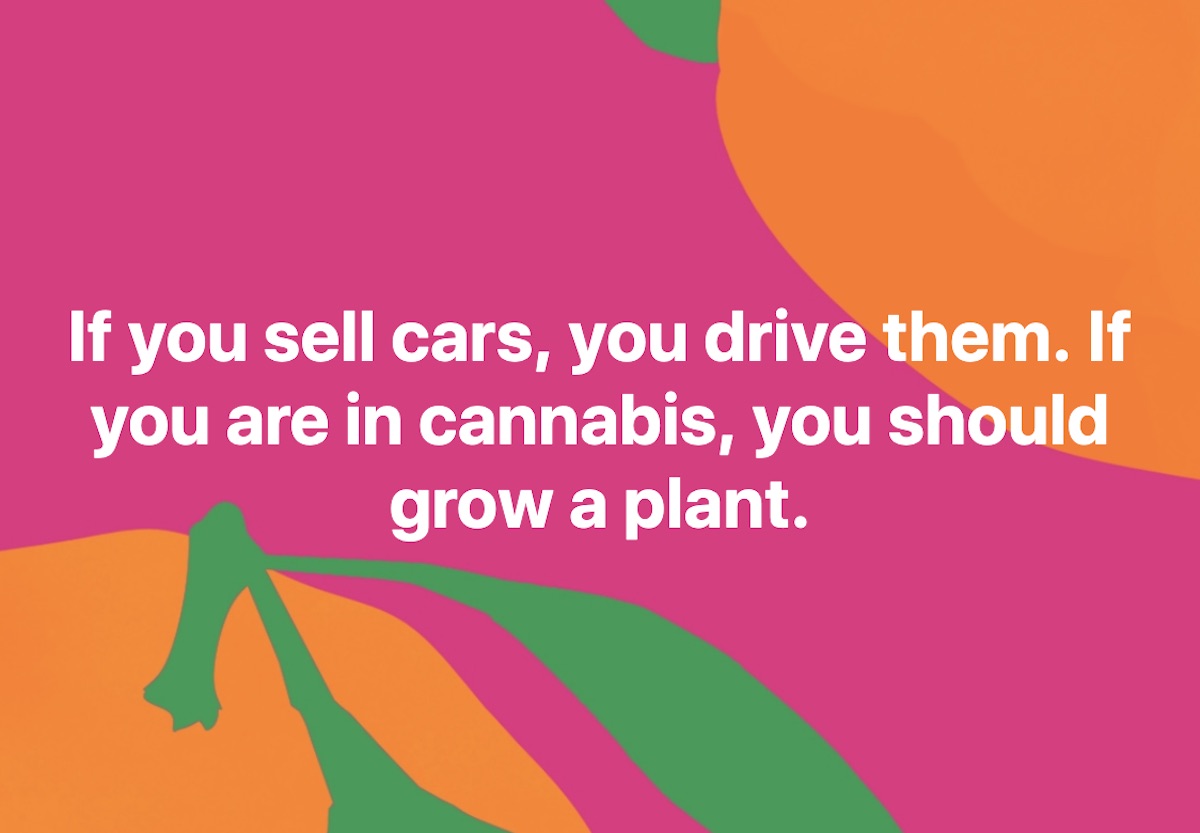
One of Chong’s infamous Facebook posts.
There is a serious lack of education about the history and the heritage upon which this whole thing is built.
Exactly. And probably those three posts brought out a lot of that. The fact is, if you have great marketing then you can get away with it. There are CEOs of cannabis companies who don’t smoke or have never touched a plant. I just really believe if you were going to be a fervent advocate of cannabis at least know the stages of the plant or just learn what it is.
I’m not expecting someone who wants to take pills to go and make Tylenol from scratch, that’s unreasonable. They are not scientists. But to grow something is human. That is how we feed ourselves. It’s from day one of the human race that we had to grow to eat. The fact that you can’t or you don’t want to grow something that you are involved in really speaks to me about why are you here. Because humankind grew to eat right? And to feed their animals, that they then ate as well, or they got milk from. So, it is natural for us to grow something because we have to feed ourselves.
But now we are in this consumer society where you could just go to the store and get some nice package in a nice styrofoam dish with some plastic wrapper that’s containing an animal that’s been slaughtered that you never came in contact with. It’s just a piece of them. Or a bag of carrots, we have no connection anymore to our agrarian roots.
Also, I’m really observant. I was a very shy kid growing up, so I would just sit in the back of the class and just watch everybody and everything. I learn how to be very observant and also watch body language and be that. Now just observing the people in our industry — and again, I’ve only been in it for five years — is very interesting. It is divided into certain groups. And those memes I create talk about those groups. I try not to be too mean. What I do see is the ones that come in for monetary reasons. And then the group that has been in it for at least ten years that are seeing this new group come in and making money, or at least trying to make money. And then you see the group that was 20 or 30 years ago basically working on and living on handouts. Or no one knows their name.
The group now that is making the 18 karat gold vapes get all the media play because they are shiny, they are new, they are young, they are fun. But there are people that have been in it for a long time, like Pebbles Trippet right? She’s not young, she’s not blonde, she doesn’t post the side boob on Instagram. I would say not a lot of people know who she is, but they should. She is one of the few reasons why they able to sell 18 karat gold vapes.
What really ticks me off is that they don’t have any respect for this or where it came from. Of course, I’m involved with some of those people but I’m always taken back when they don’t at least acknowledge where it came from. Especially looking at many of the comment online from people in the industry saying who is Dennis Peron and what is Prop 215? I had to basically send the guy a Wikipedia link to it and say this is the group that made the way for your CBD company. Have some respect for it. Because it didn’t begin with you. So that’s a big issue. Respecting the elders, because they are almost gone.
You are asking the cannabis world to learn how to use design thinking in their process. And the first thing you do in design thinking is you understand history and do research.
Exactly. So well put. We need design thinking in our industry. And I’m not talking about great looking packaging. I am talking about the design thinking of fundamental empathy for the customer and the product. Did you do your research? Did you do your homework? Did you get in and dig in the dirt? Did you throw down and pay tribute and understand whose shoulders you’re standing on, and then, start standing? It’s fine to stand on the shoulders of giants as long as you know and respect who those giants are.
There’s a great designer that I respect whose name is Mau. He put out a book called Massive Change. There is a great quote in there which I feel really reflects cannabis is this one. “Most of the time we live our lives within these invisible systems, blissfully unaware of the artificial life of the intensely designed infrastructures that support them.”
So, for me, this is about cannabis. These people that are coming in now are blissfully and intentionally unaware of what built it, and what supports them. That ignorance, this is what happens when the ignorance hits. When they see that it’s invisible, that’s when their businesses are going to fail.
Aficionados
Seibo Shen: Changing the Conversation With Innovative Consumption
Seibo Shen on his relationship with cannabis, his belief in the role it can play in health and the long-term impact “Vape Gate” will have on the industry.
Published
5 years agoon
October 31, 2019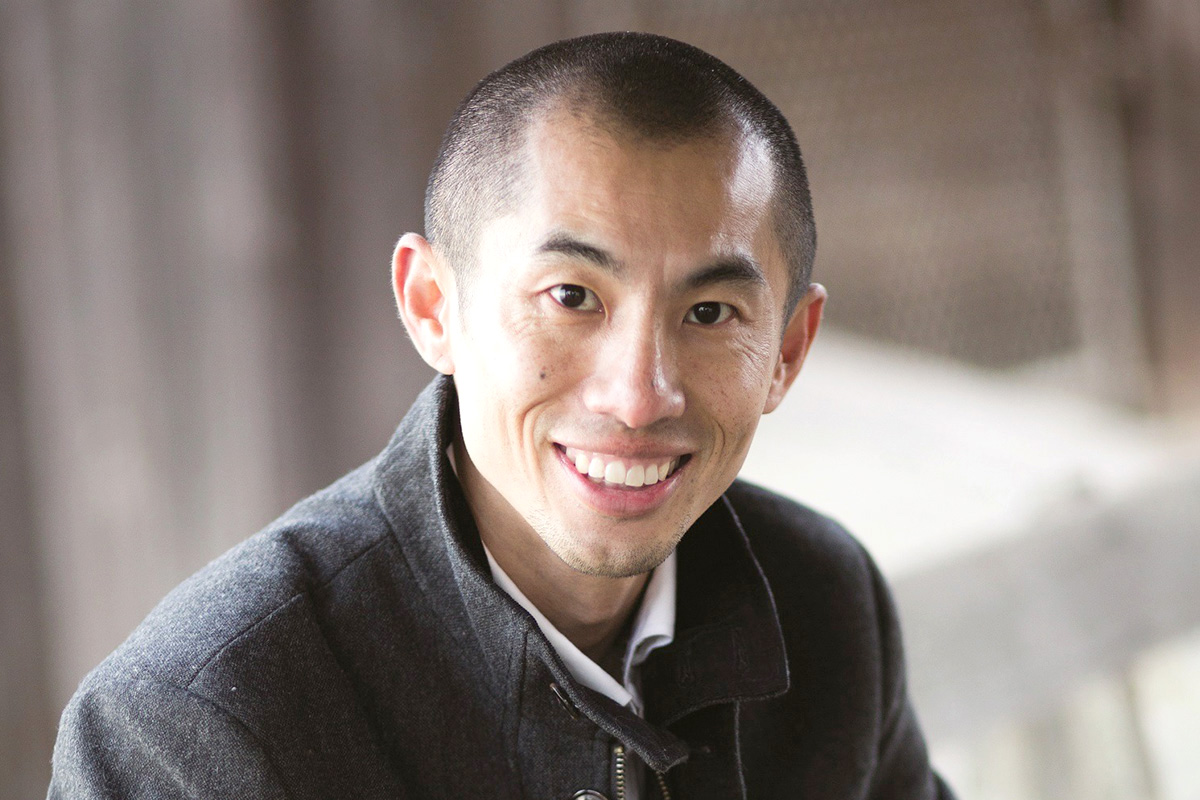
Seibo Shen is the CEO behind two of the most innovative, design-driven technology companies in the cannabis industry. His first foray into weed in 2010 saw the creation of the hugely popular and multi-award-winning VapeXhale Cloud EVO desktop vaporizer. His latest hardware venture, Hanu Labs, has created another stunning example of form and function for vaping enthusiasts and cannabis aficionados — the Hanu Stone.
Cannabis Aficionado spoke to Shen about his relationship with cannabis, his belief in the role it can play in health and achieving the flow state as well as the long-term impact “Vape Gate” will have on the extracts industry.
Cannabis Aficionado: Tell us about your relationship with cannabis and how it helps you?
Seibo Shen: I grew up in an Asian household, where intellectual horsepower was almost idolized. I have roughly 90 cousins and of those 90 cousins, at least 60% of them are either doctors or lawyers. Only three don’t have advanced degrees — and I happen to be one of them. So, I was always focused on being the smartest person that I can be. Ultimately, this resulted in an adult who was not in touch with his feelings. I was very good at expressing anger, but sadness or negative feelings, I would always push aside.
Cannabis enabled me to really open up and gave me the ability to process feelings, to empathize versus just sympathize, to get in touch with my feelings. It helped me recognize the importance of listening to my body when it would tell me things like, ‘Hey, Seibo, you’re tired right now — you should rest.’ But my brain would always override that go and say, ‘You’re an entrepreneur, all the other entrepreneurs are working past midnight’ and I would just stay up and the quality of my work would suffer. IQ can only get you so far. Cannabis opened me up to a wider variance of emotions.
Once I started trusting what my body was telling me, I was no longer using a lot of mental horsepower asking myself questions like, ‘Am I a CEO because I’m just a motivated person, or am I a CEO because I want daddy’s approval?’ Things like that were always going through my mind. I was able to focus on the things that I want to do, like being a dad, being an entrepreneur, being a husband, without the distractions of all those other things. I think that’s why I’ve been successful in those areas.
That’s an amazing nod to cannabis’ power.
Totally. That’s why I’m so bought into cannabis. You know why? When I talk to my daughter about cannabis, I’m not trying to overblow it or demonize it. I just try to tell her the facts of how it’s helped me, how it’s helped our family, and let her make her own decisions.
My relationship with cannabis has evolved throughout the years. Now I use cannabis in a 100% positive way. But there were times when I would use cannabis to numb the pain. I smoked all the time and would use the excuse that no one’s ever died from cannabis. But, yes, there were times I was using it to avoid pain. But there were times when I would use cannabis to enhance whatever I was doing. Being able to delineate the two is very, very important. I would rather use it to enhance all the other things that I like because feeling the pain teaches you things. If something is painful, then it’s probably something you don’t like to do, right? So, listen to your body and feel that pain as opposed to just smoking some weed and trying to make it go away. Utilize your feelings to start figuring things out. Ask yourself questions like, ‘what am I doing that make me feel this way?’ Hopefully, you’ll get some clarity out of it.
In your opinion, what’s the most important thing that needs to be addressed when talking about cannabis and cannabis products?
It’s proper usage. I am a huge proponent of cannabis and use it to enhance a lot of my daily activities, but I think younger users can abuse the fact that cannabis isn’t physically lethal so they consume more than typically needed. I know a lot of highly functional entrepreneurs that ‘wake-and-bake’ but for every one of those types, I know at least 10 who do the bare minimum to keep their jobs and consider themselves to be ‘successful.’ Ultimately, just make sure that the cannabis is servicing you and not the other way around.
We like to promote CCU (conscious cannabis use) which means that before you consume cannabis, think of the intent and/or outcome of why you are using it. In my experience, for those that are constant users, many times they say they consume cannabis when they are bored and I don’t believe that to be an effective use case of cannabis if that is done consistently.
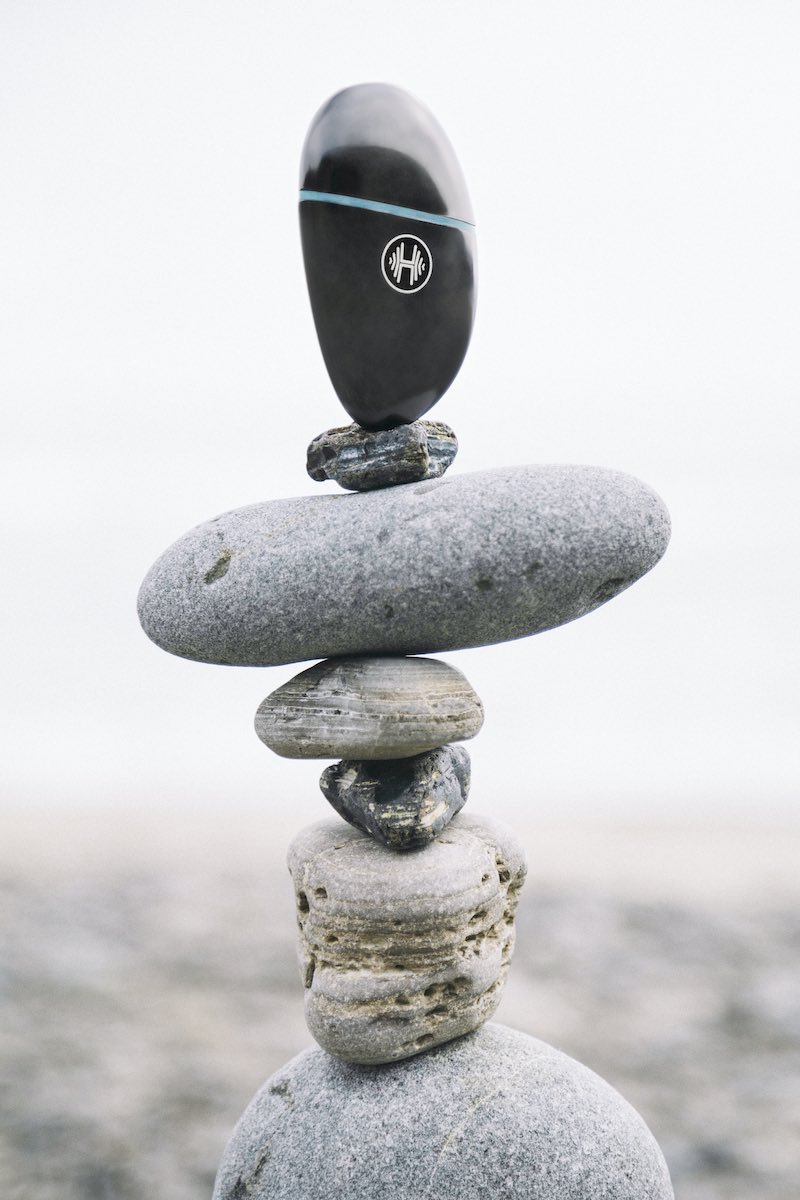
PHOTO | Hanu Labs
The Hanu Stone has a unique, almost organic look. Can you share the design thinking behind it?
There are a few reasons why we decided to design the Hanu Stone this way. The first thing is, I look at the cannabis market as one of health and wellness. Vape pens borrow their look from e-cigarettes which took their form factor from cigarettes. I felt it was a disservice to the industry if we continue to make devices that were long and skinny and reminded people of something that was detrimental to their health, versus something that would give them therapeutic benefit and utility.
Second, when our designer would get nervous or anxious, he would always rub his worry stone which he wears as a necklace. When I became aware of that concept — and because you can’t always vape indoors — I thought it was a great form factor for those that needed to reduce anxiety but couldn’t inhale from the device.
Lastly, my wife and I had hot stone massages and before our session, the massage therapist told me to close my eyes, hold the stone in my hand, and say a prayer of gratitude. At first, I thought it might be a little hokey but I did it anyway and I was overcome by this feeling of relaxation and joy.
As an extract manufacturer, has the recent vape crisis had an impact on your business?
At first, it was obviously a downer for a lot of people in the industry. For manufacturers like us, who pride ourselves on our material selection, the vetting process of our partners and the quality of their oil, we actually became quite excited. That’s because most of the dispensaries are now saying that their customers have a higher appetite for safer products.
To buy products they know are up to standard, to buy from companies they can trust.
Right. By doing things correctly from the get-go, we’re actually the beneficiaries of this crisis. Our product is premium price — our hardware is roughly two and a half times the cost of other hardware on the market. At first, we were thinking, ‘Man, this might price us out of the market.’ But a lot of our partners believed in the efficacy — the user experience as well as the quality of materials that we selected. We had a long-term strategy and we’ve also begun seeing the benefits in the short term.
So, ‘Vape Gate’ is turning into a beneficial thing for you?
Yeah, I mean, our business is still down. But the dispensaries have told us that people are now really asking about what’s being put in the oil, asking how the hardware is manufactured — these are questions they’ve never asked before. While we haven’t gone back to our previous sales figures that we had prior to vape gate, we’re now getting to the point where we’re seeing an upturn again, and not continually going down — which it was for the last few weeks.
There are likely many vape manufacturers that fell away fairly quickly as a result of this. The tried-and-true companies that know what they’re doing and make quality products are going to be able to stand.
Exactly. You hit the nail on the head. All the bad actors were quickly identified. A lot of the manufacturers that were either creating the diluents or the thickeners have also closed up shop. Now, we’re having a conversation where questions are being asked that were never on people’s radars. Consumers just thought a vape pen is a vape pen is a vape pen. But anyone that’s used facial tissue or toilet paper knows that high-quality toilet paper or facial tissue, like Kleenex, feels a lot different than the single-ply stuff.
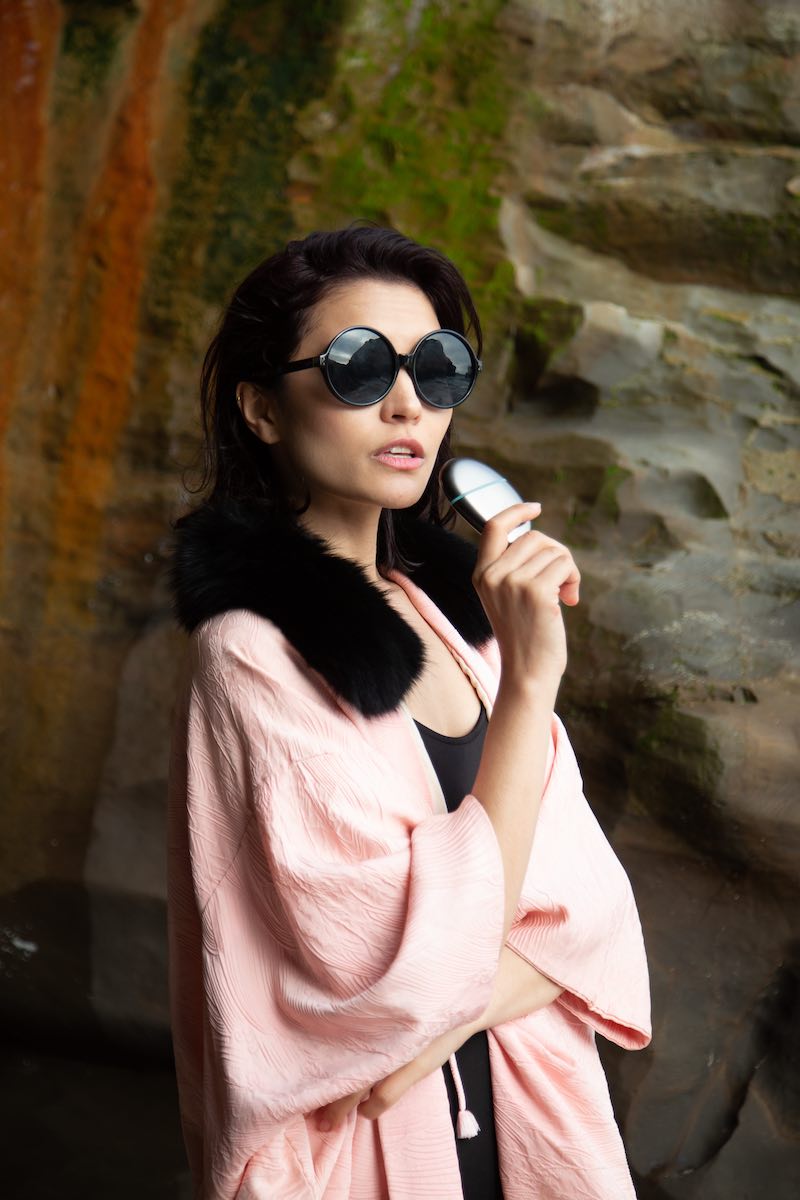
PHOTO | Hanu Labs
Do you see that as being the main conversation you’re going to have with your audience?
We’re spending roughly 95% of our time talking about safety. Previous to that, we were also talking about all the useful ways that you could utilize cannabis to enhance your life. We don’t really want to step away from that, because there are a lot of positive benefits from consuming cannabis before hiking, or before meditating or, like myself, before jujitsu. We would love to keep kind of pushing the education in that area, not just in the safety area. Even if you’re not a patient, or sick and need to utilize cannabis for medicinal reasons, there are some really positive ways that you could use cannabis to enhance all the various activities in your life.
For us, what we’re kind of coming to the conclusion of is, cannabis is a great way to get into flow state. Whenever you’re in flow state, I believe you’re the best version of yourself for that particular activity. Whether it’s jujitsu, stand-up comedy, or even talking on a panel, once you’re fully focused in and engaged in what you’re doing, I think the best expression of yourself comes out. I believe cannabis really helps people get into flow state and helps people be the best version of themselves.
What are you doing to change the stigma around cannabis?
I have been actively trying to change the stigma of cannabis in two main areas; parenting and athletics. My daughters are four and nine and the way the country looks at cannabis has dramatically shifted since my eldest daughter was born. I created a group called CannaDads to help educate parents about the pros and cons of cannabis. It also gives them a safe space to figure out what is the best way to speak to our children about cannabis, as it was only for medical patients up until 2016 in California. The group is open to mothers as well but there are groups like CannaMom and CannaParents and I really wanted to create a space for fathers who were very involved with their kids and to meet like-minded fathers doing the same.
I also run another group called CannAthlete which is specifically to help and educate athletes who are on prescription medications like opioids and switch them to cannabinoids. In addition to helping them with recovery, we also discovered that it can aid in certain training situations.
Lastly, by designing devices like the Hanu Stone, I believe that we are shifting the paradigm in the way people look at and perceive cannabis consumption devices. Whether it’s the high-end industrial design or the extraordinary utilitarian functionality of the pods, we wanted to create something that not only looked great, but the performance of the device matched its appearance.
What’s next for you?
I want to continue designing and innovating new, exciting consumption methodologies for cannabis. We have made significant improvements since the first vaporizers were introduced in the early Nineties and I think we are about to see some more breakthroughs when it comes to heating elements and/or delivery methods. The more people we can help, the better.
Aficionados
Brands and Buds: Matt Morgan and His Cannabis Empire
Matt Morgan, a sixth generation Montanan farmer, exclusively tells Cannabis Aficionado how he grew one of the cannabis industry’s most successful companies.
Published
6 years agoon
December 29, 2018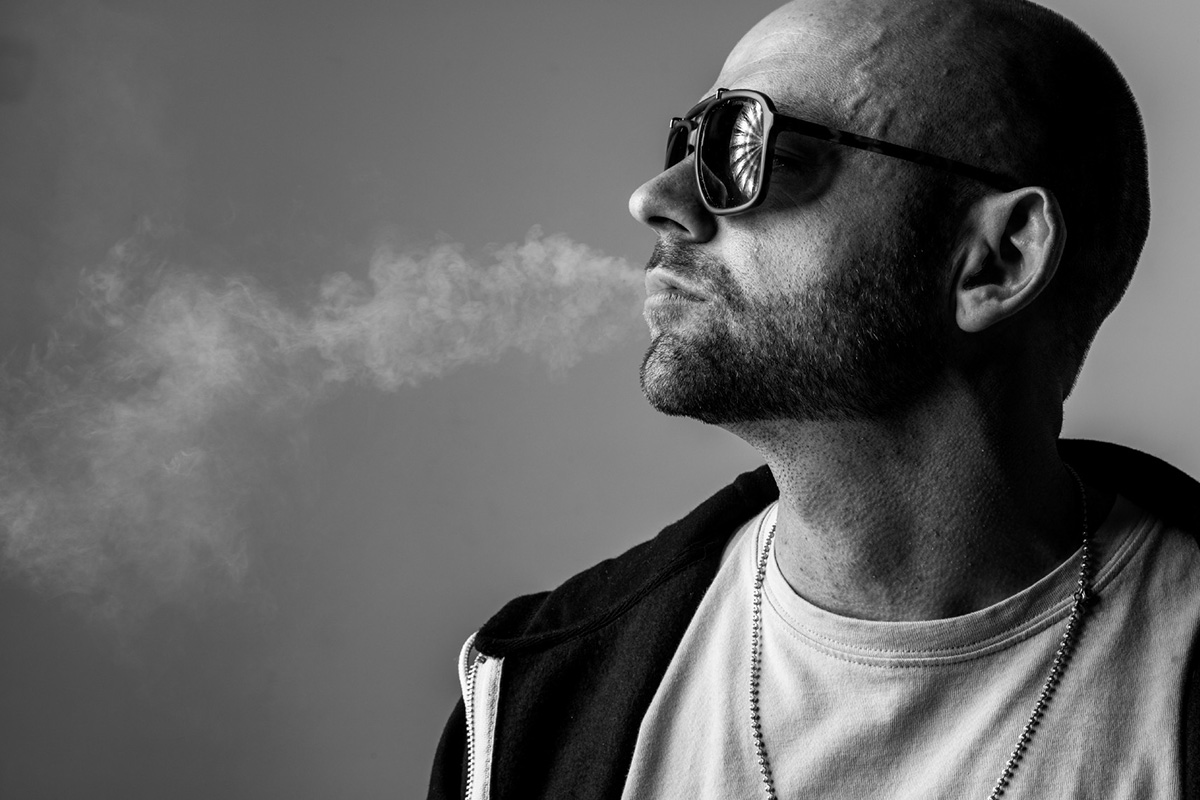
In a week I’ve become something of an expert in all things Matt Morgan. He’s a fascinating read and is achieving rock star status as one of the first cannabusiness celebrities in the short time that weed’s gone legal.
If you’re one of his 777k followers (at press time) on Instagram you know that Morgan lives something of a fantasy lifestyle, photos of beautiful grow rooms with mountains of colas and bags of buds piled sky high—and even though he makes his cannabis business lifestyle look easy, you better believe it’s not. His hard work and tremendous drive are beginning to pay dividends, but only after years of growing his personal empire.
Matt Morgan is a builder of cannabis companies and they’re more than just uber successful. They’re powerful, game-changing, and visionary. In little more than a decade of hard and determined work, Morgan has carved out a comfortable niche.
For Morgan, a sixth-generation farmer from Montana, leaving the family’s fields of alfalfa and wheat to pursue cannabis meant more than breaking with tradition, but changing his parent’s perception that stoners were stupid, lazy, and wouldn’t amount to anything.
“My family was very anti-cannabis, actually. They would much rather have me drink alcohol growing up versus smoking cannabis. They had all the propaganda shoveled in their mouth for so many years about how cannabis was basically the devil, right? The last thing my family wanted me to do was to be involved in that sector — from a personal consumption standpoint as well as a business standpoint,” says Morgan.
“I’m still carrying the torch as far as farming goes, but its just in a completely different way. I’m a much bigger fan of the cannabis plant versus alfalfa!”
Despite Morgan’s family attitude, he wouldn’t change a thing about his childhood explaining how growing up in Montana “just gives you a certain set of core values” that have shaped and guided him in his pursuit of success in the States and beyond.
“I think people pick up on it very quickly when you have small-town roots,” says Morgan. “You shake peoples hands, and when you shake people’s hands, that’s your word. You follow through on everything that you say you’re going to follow through on.” He adds emphatically, “Honesty and integrity, all those things are instilled in you growing up in a place like Montana. People automatically trust you more or less based upon how you act, how you’re raised, and I think that goes a long way in business.”
Morgan’s moral code would soon pay off as he got his first taste of success selling real estate in his early twenties. What followed in 2008 is probably Morgan’s biggest game changer as the financial collapse left him to do some serious soul-searching.
That need to land on his feet and find the next big business opportunity led Morgan to settle on cultivating cannabis after months of online research. After getting his Montana medical marijuana card, Morgan blindly started growing; — expecting his first crop of six plants would produce High Times-worthy buds.
“In my head, I was like, ‘Man, if a bunch of hippies can grow up plants from seeds and grow some good buds, there’s no chance I’m not going to pull this off.’ But of course, my first couple attempts were epic failures,” Morgan laughs.
“I had no idea what I was doing. You name a branch, I hit it on the way down.”
Lucky for Morgan, he’s a fast learner and recovered quickly from his mistakes. Over a ten-month period, he scaled his grow operation to one of the largest in the state. Everything was going well for Morgan in Montana’s medical program where a caregiver could grow up to six plants per patient, with no cap or limit on size. Morgan’s hometown of Missoula was booming with more than 60 dispensaries in a town of 60,000-plus people.
“The ratio was ridiculous and Montana doesn’t really like change all that much,” says Morgan. “Once they saw all these dispensaries popping up and everybody growing cannabis, legislation came in and put a halt to everything. They limited each share grower to three patients and that’s when I started looking at other opportunities to scale the way I wanted to scale.”
In 2010, Arizona was crafting some of the most favorable cannabis laws for building a large-scale operation with unlimited plants, weight, and growth — and if he could secure one of the licenses from the state — it had everything Matt Morgan was looking for and more.
Moving to a new state where you don’t know anyone could seem daunting and intimidating, but not for Morgan who immersed himself by building a brand of hydro stores that would soon service the states large grows. With three Ugrow hydro stores under Morgan’s leadership and making steady gains, Morgan knew the key to scoring one of the 121 state licenses would be seeking out the who’s who of Arizona’s cannabis culture.
“Since I really didn’t know anybody the hydro stores gave me a chance to really get involved. I’d meet and greet with everyone in the space, which was very helpful early on.”
And his strategy worked. Knowing that the licenses would be highly competitive, Morgan’s intrepid networking led him to an influential senator’s son and indeed, they won a license in the first round of applications, quickly acquiring their second within a few months of being in business and Bloom dispensaries was born.
In as little as ten months that Morgan and his partner had grown Bloom dispensaries, they were now employing 120 personnel and earning revenues in excess of a million dollars a month. It’s here that I learn that Morgan has as huge a heart as he does a mind for business. As a difference in Morgan’s life is created, or as he experiences a certain level of success, he makes sure that the wealth is spread around.
“You’re literally seeing people, hiring them, and they’re driving to work in a car that barely runs and then six months later because of this job they’re driving a new car. Things like that are just so fulfilling in general. Helping and seeing all these people that you’re making their dreams become reality. The larger you can scale, the more people you can help,” says Morgan.
Morgan recalls how his mentors, most of whom were CFOs, CEOs of Fortune 500 companies and Fortune 100 companies gave him the “playbook on how to be a monster in the business space” because they understood the business from A to Z. Without them, he says, it would “take me forever to figure out how to recreate the wheel. They really turbocharged everything for me.”
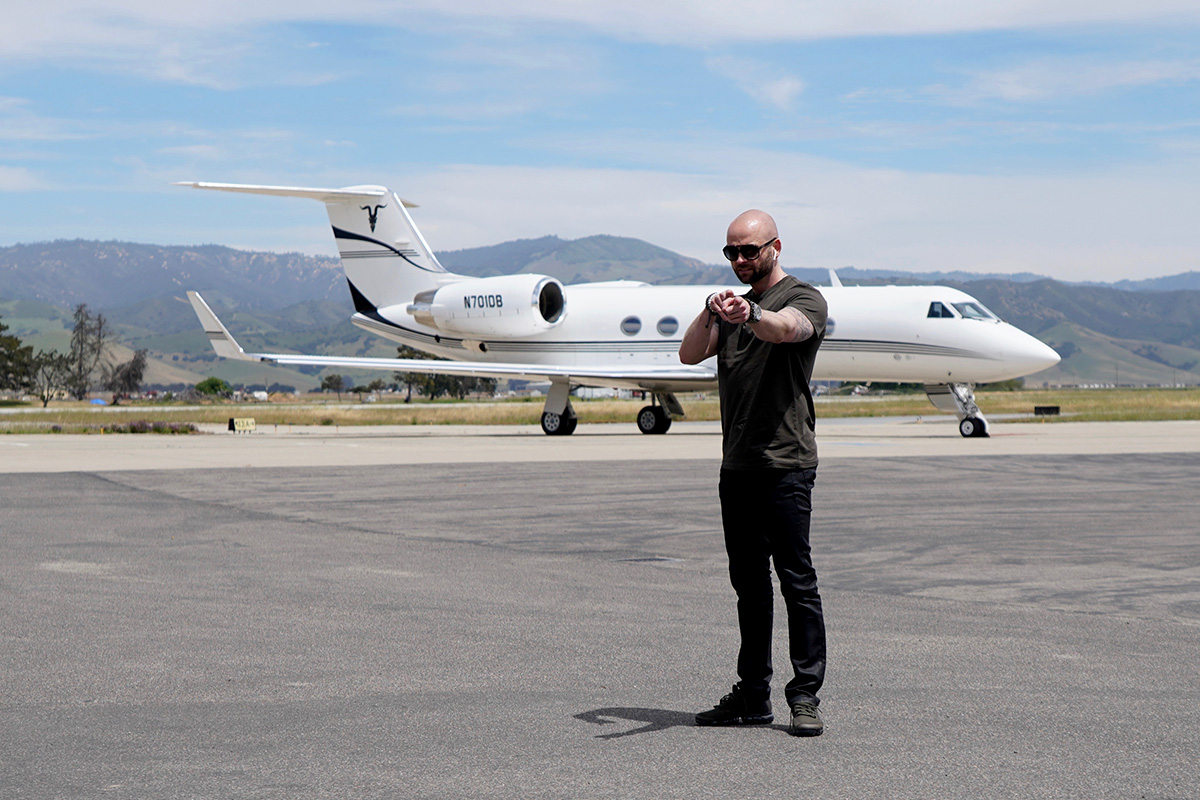
To create Morgan’s own personal game-day book of business moves, he relates taking a lot of pages from other industries playbooks and “globbing them into a hot soupy mess” and navigating his way through to make sure he avoids all the common pitfalls or as many as he can.
Morgan quickly expanded the business to include more properties and turning over a million dollars a month in sales. It wasn’t long until his success attracted the eye of an investor who within hours of meeting Morgan wanted him to immediately fly on the company jet to meet his boss in south Florida. It didn’t take long for Morgan to meet and get a feel for the family company and know that he’d be a better fit working for them — but that was only after a “grueling six-hour interview process where they hammered me with questions and it felt like an interrogation,” says Morgan.
“In their defense, they should be asking as many questions as they want. The family office put up an absurd amount of money to build out the cannabis company and gave me a huge injection of capital to scale to sizeable proportions.”
But things didn’t go as smoothly as expected for Morgan when Bloom’s investors couldn’t come to terms with the family office. In the end, the family office would make an offer to start a new company leaving Morgan to walk away and completely divest himself from Bloom. In March of 2014, Tryke and Reef dispensaries were born.
To get started, Morgan created his temporary corporate headquarters in Tempe, Arizona, hired his executive team, and after receiving a license in the state he quickly set up three dispensaries in the somewhat remote Queen Creek. Morgan knew he had to attract the younger generation of trendsetters, the 21 to 30-year-old segment who he describes as the “cool kids who want to a part of this movement.” So he made it the “cool place to be” and brought in Wiz Khalifa, Berner of Cookie’s fame, and the Jungle Boys. Soon enough Reef dispensaries had 500 people a day driving 30-60 minutes out to the sticks because Reed wasn’t just a dispensary, it was a destination.
With a proven track record in Arizona, Morgan broke into Nevada and was awarded all of the eight applications submitted. “We won the most licenses in the state of Nevada, built our flagship store next to the Strip, built the 24/7-hour dispensary in North Vegas, popped up two more dispensaries in the Reno area and popped up one more flagship in Arizona with a large cultivation.”
Preparing for Nevada’s first day of legalization on July 1st, 207, found Morgan buying as much weed as humanly possible. “I was gobbling up product left and right in preparation because I knew that consumption would be a five to seven multiplier on what it currently was — and no one believed me,” Morgan says incredulously. “They thought we’d be lucky if we got a two multiplier, but all I could think was ‘You guys are nuts!’ and I was actually right. I ended up stocking several thousand pounds of cannabis in anticipation for rec sales.”
View this post on Instagram
Market research 🤓 #beautifulgirls @jungleboys
A post shared by SNAPCHAT 👻 GeneralMorgan (@thematthewmorgan) on
To say the first day of Nevada’s legalization was a pivotal moment for Morgan would be as big an understatement as saying the Apple iPhone didn’t change the course of telecommunications. Standing on top of a building the size of two and a half football fields at 11:30 pm the evening that Nevada went rec, Morgan was scratching his head wondering just how he got there, “There were all these news outlets trying to interview me and so many cameras in my face. Looking around I wondered ‘how in the hell did I get 1200 people to stand in a line at midnight to buy weed?’” says Morgan.
“This massive line wrapped all the way around the building. This was a wow moment.”
Everything that Morgan had worked for over the past two and a half years in Nevada was culminating in that very moment. The fruit of all his labor was paying off and as he watched the fireworks go off at the stroke of midnight, Morgan knew that what he had accomplished was next level.
By the time that Morgan was exiting Reef, the company that he had built was running at over $100 million revenue run rate on an annual basis. It was common while he was there to hear comments about the strength of the culture instilled within the company — which Morgan equates back to his chief human resource officer’s core values and company culture.
“When I left Reef, we had 430 employees and every single one of them had a very similar culture and core values,” said Morgan. “You’d have a contractor, for example, come in and you’d ask someone for a broom and four people would be running as fast as they could to get a broom. I think that’s partly because they saw the CEO taking out his own trash, or I’d be picking up garbage all the time in the parking lot. I just don’t care. I’m not above any job, you know what I mean.”
No matter what size of the job, or even what job needs to be done — Morgan is not afraid to roll up his sleeves, dig in, and get dirty. That must’ve been what led Dan Bilzerian to come calling on Morgan. “Bilzerian’s been a good buddy for a long time and he approached me to help him build out a cannabis brand, be a brand ambassador and one of his advisors. We recently launched his new brand Ignite, and I’ve been intimately involved with helping him get that started as well,” says Morgan.
“Business is like a full-contact sport,” says Morgan. When it comes to big money, all bets are off, and it brings me back to survival of the fittest. You’ve got to do whatever it takes to be successful… and always go to bed being the hardest working guy that day.”

